Protección social
El informe sobre el Estado Global de los Programas de Transferencias Monetarias 2020 de la CALP Network muestra lo siguiente:
- Trabajar con, a través de y junto con los sistemas de protección social es ahora considerado esencial para fortalecer el nexo entre la ayuda humanitaria y el desarrollo. Los actores humanitarios son cada vez más activos en este espacio.
- Los profesionales encuentran que los tres grandes desafíos para la vinculación eficaz son los siguientes: (i) la falta de coordinación entre los actores involucrados, (ii) los sistemas de protección social no están diseñados para responder a las crisis humanitarias, (iii) los profesionales carecen de experiencia en la protección social.
- Fundamentalmente, no existe una solución de “talla única” para la vinculación de los PTM y la protección social. Se deben considerar compensaciones entre la eficiencia, la eficacia, la rendición de cuentas y la sostenibilidad para asegurar los mejores resultados para las personas que viven en situaciones de crisis, y esto depende del contexto, los sistemas existentes y los plazos. La vinculación no siempre será apropiada y los sistemas de protección social podrían no satisfacer todas las necesidades. En muchos contextos, en el corto a mediano plazo, al menos, la programación humanitaria será requerida para llenar los vacíos.
Prioridades actuales
La CALP Network ha invertido intensamente en esta área temática durante el último año. Continuaremos trabajando estrechamente con el subgrupo de trabajo del Gran Pacto en Protección Social y con el equipo de la plataforma de “Protección social en contextos de crisis” de socialprotection.org para desarrollar evidencia, producir materiales de aprendizaje y brindar apoyo técnico para los actores de coordinación.
Lectura adicional
-
El vínculo entre la protección social y los programas de transferencias monetarias (PTM) - Resumen de alto nivel, la CALP Network, 2020 (en inglés)
-
El vínculo entre la protección social y los PTM en la acción humanitaria
-
El vínculo entre la protección social y los PTM – ¿Qué sabemos realmente y por dónde empezamos? Hallazgos del documento informativo de alto nivel en tiempos de Covid-19 encargado por la CALP Network (en inglés)
-
El vínculo entre PTM y protección social en la region de Oriente Medio y Norte de África (MENA) – Hoja de repaso (en inglés)
-
El vínculo entre PTM y protección social en la region de Oriente Medio y Norte de África (MENA) – Caso de estudio del Líbano (en inglés)
-
El vínculo entre PTM y protección social en la region de Oriente Medio y Norte de África (MENA) – Caso de estudio de Iraq (en inglés)
-
El vínculo entre PTM y protección social en la region de Oriente Medio y Norte de África (MENA) – Caso de estudio de Yemen (en inglés)
-
El Estado de los Programas de Transferencias Monetarias 2020 – Capítulo 8: Vinculando los PTM y la protección social (en inglés)
Featured content

Linking CVA and Social Protection in the MENA Region – Crib sheet
Report
Building linkages between humanitarian cash and voucher assistance (CVA) and social protection (SP) has become an increasingly prominent topic over the past five years and the Middle East and North Africa (MENA) region has been at the centre of this evolution. The objective of this resource set (the crib sheet and 3, soon to be 6, regional case studies) is to ensure that the CALP Network...
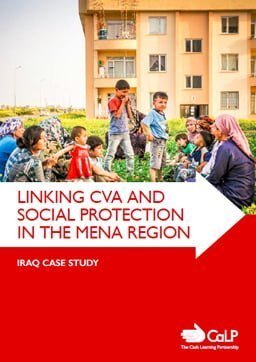
Linking CVA and Social Protection in the MENA Region – Iraq Case Study
Report
Building linkages between humanitarian cash and voucher assistance (CVA) and social protection (SP) has become an increasingly prominent topic over the past five years and the Middle East and North Africa (MENA) region has been at the centre of this evolution. The objective of this resource set (the crib sheet and 3, soon to be 6, regional case studies) is to ensure that the CALP Network...

Linking CVA and Social Protection in the MENA Region – Lebanon Case Study
Report
Building linkages between humanitarian cash and voucher assistance (CVA) and social protection (SP) has become an increasingly prominent topic over the past five years and the Middle East and North Africa (MENA) region has been at the centre of this evolution. The objective of this resource set (the crib sheet and 3, soon to be 6, regional case studies) is to ensure that the CALP Network...
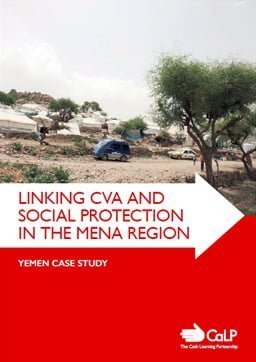
Linking CVA and Social Protection in the MENA Region – Yemen Case Study
Case Study
Building linkages between humanitarian cash and voucher assistance (CVA) and social protection (SP) has become an increasingly prominent topic over the past five years and the Middle East and North Africa (MENA) region has been at the centre of this evolution. The objective of this resource set (the crib sheet and 3, soon to be 6, regional case studies) is to ensure that the CALP Network...

Linking Cash and Voucher Assistance (CVA) and Social Protection – Occupied Palestinian Territories (OPT): Country Summary
Report
This country summary is part of a larger resource set, providing practitioners with examples of different approaches to linking CVA
and social protection.
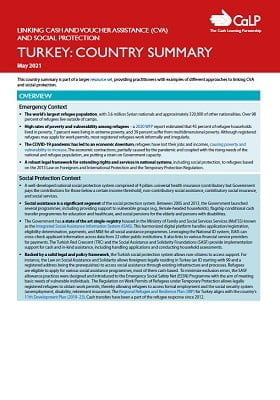
Linking Cash and Voucher Assistance (CVA) and Social Protection – Turkey: Country Summary
Report
This country summary is part of a larger resource set, providing practitioners with examples of different approaches to linking CVA
and social protection.
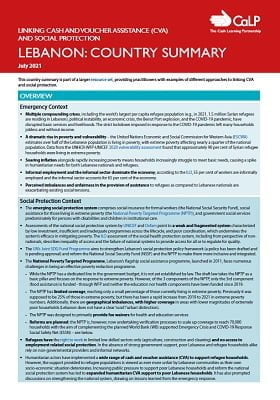
Linking Cash and Voucher Assistance (CVA) and Social Protection – Lebanon: Country Summary
Report
This country summary is part of a larger resource set, providing practitioners with examples of different approaches to linking CVA
and social protection.
Líder temática
Últimos recursos
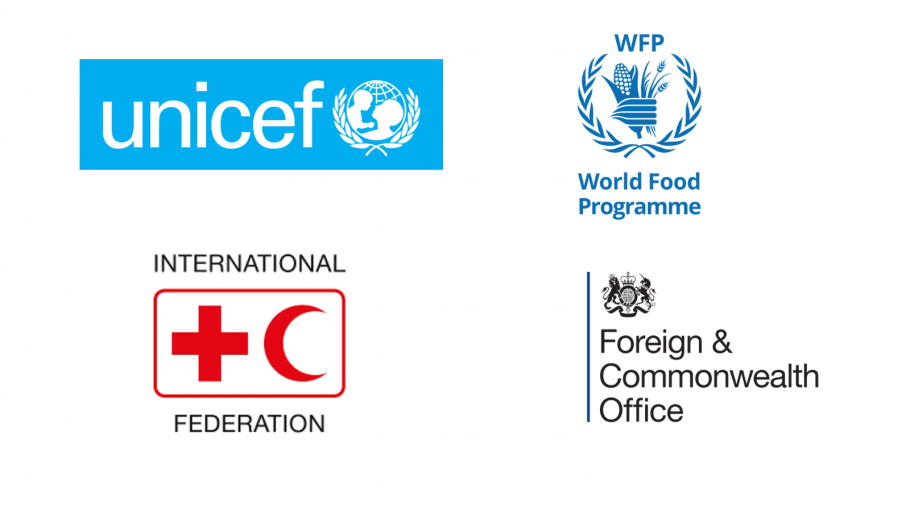
Changing the mindset – turning theory into practice: Incorporating gender-sensitivity into linked humanitarian cash and social protection interventions
Members event
This is one of a series of webinars organised by the Grand Bargain Cash Sub Group, co-led by IFRC, UNICEF and FCDO to engage humanitarian actors with social protection by exploring the linkages between the two agendas and the design and implementation of Cash and Voucher Assistance (CVA).

We Don’t Do a Lot for Them Specifically
Report
Cash based assistance is a large part of government and NGO responses to social protection needs during the COVID-19 crisis. But is this assistance reaching people with diverse SOGIESC (aka LGBTIQ+ people). There are clear needs, borne of systemic discrimination, including loss of informal sector work,...

We Don’t Do a Lot for Them Specifically – Quick Guide
Report

How to promote better nutrition through social assistance – A guidance note
Guidelines and Tools
This guidance is intended to inform the design or adaptation of the following social assistance interventions to make them more nutrition-sensitive (see Box 1): cash transfers, cash-plus, in-kind transfers, school feeding, and public works programmes.

Linking Cash and Voucher Assistance (CVA) and Social Protection – Lebanon: Country Summary
Report
This country summary is part of a larger resource set, providing practitioners with examples of different approaches to linking CVA
and social protection.

World Food Programme Strategy for Support to Social Protection
Policy paper
In July 2021 WFP launched its Strategy for Support to Social Protection. It explains how WFP will contribute to the development of high quality national social protection systems and programmes in contexts of food insecurity, as a complement to its work responding directly to food security-related...
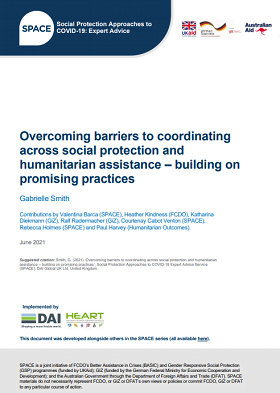
SPACE Overcoming barriers to coordinating across social protection and humanitarian assistance – building on promising practices
Policy paper
The importance of strong coordination between actors preparing, designing and implementing shock responses is well accepted. This has been highlighted specifically concerning shock responsive social protection (SRSP) as well as linking humanitarian action and social protection (HA-SP). However, despite...

SPACE Deciding when and how to link humanitarian assistance and social protection: guidance and tools for response analysis
Policy paper
This short paper presents two complementary ‘Tools’ to guide thinking and decisionmaking on humanitarian programme design, providing the basis for conducting a comprehensive response analysis to inform decisions on linking HA-SP. These can be used to determine the likely feasibility and...
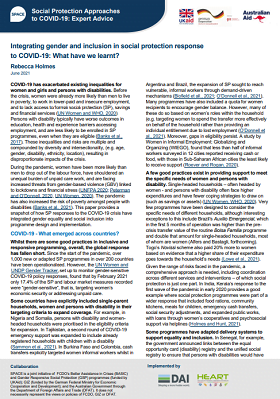
Integrating gender and inclusion in social protection response to COVID-19: What have we learnt?
Policy paper
COVID-19 has exacerbated existing inequalities for women and girls and persons with disabilities. During the pandemic, women have been more likely than men to drop out of the labour force, have shouldered an unequal burden of unpaid care work, and are facing increased threats from gender-based violence...
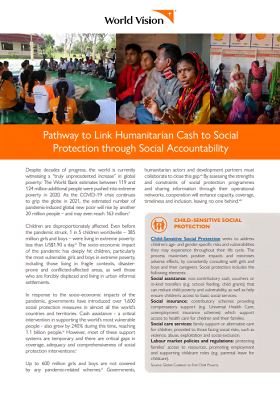
Transfers with Impact – Pathway to Link Humanitarian Cash to Social Protection through Social Accountability
Policy paper
In response to the socio-economic impacts of the pandemic, governments have introduced over 1,600 social protection measures in almost all the world’s countries and territories. Cash assistance – a critical intervention in supporting the world’s most vulnerable people – also grew by 240% during...

CVA for Child Protection Outcomes: Case study from Cambodia
Video
Save the Children Cambodia and seven partner organizations are working to improve households’ ability to care for their children and achieve positive child protection outcomes. With support from USAID Cambodia and European Union in Cambodia, FCF|REACT is providing monthly cash transfers and supporting...

Documento de sistematización Evento Regional de Aprendizaje: Vinculando las transferencias monetarias con los sistemas de protección social
Informe
El presente documento tiene por objetivo documentar el proceso de organización del Evento Regional de Aprendizaje de “Vinculando las transferencias monetarias con los sistemas de protección social”, convocado por REDLAC y el Grupo de Trabajo de Transferencias Monetarias -R4V para el 20 de Mayo,...

SPACE What are future financing options for shock responsive social protection? (Summary Brief)
Policy paper
This paper, and the longer Technical Primer that accompanies it, are designed to inform discussions around financing shock-responsive social protection (SRSP). It starts by clarifying terms and providing a framing to guide approaches to SRSP financing. It then provides a high-level overview of current and...
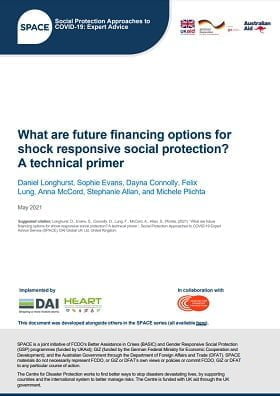
SPACE Gender and Social Protection in the COVID-19 Economic Recovery: Opportunities and Challenges
Policy paper
This paper analyses the potential contribution of social protection to a gender-transformative economic recovery over the medium term, defined as running from the present to the end of 2022. It builds on the existing Social Protection Approaches to COVID-19 Expert (SPACE) advice publication; SPACE Social...

Social protection and climate change: scaling up ambition
Policy paper
Social protection can be a strategic tool for climate risk management and provides an important answer to the current calls for climate action and for increased resilience as we recover from COVID-19. The Paris Agreement demands rapid action to keep the average temperature from rising above 1.5 degrees,...

What are future financing options for shock responsive social protection? A technical primer
Guidelines and Tools
This paper aims to advance these discussions in a number of ways. As ‘financing for SRSP’ is understood differently by different people, it starts by providing greater clarity on what this term constitutes, and its relation to disaster risk finance. It acknowledges the broad potential remit of...
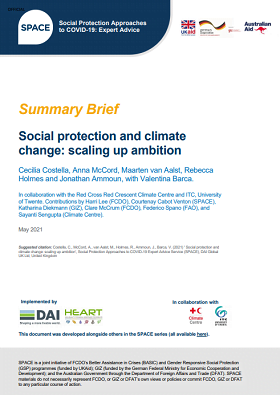
SPACE Social protection and climate change: scaling up ambition (Summary Brief)
Policy paper
Climate change, once perceived as a long-term environmental issue, is now an immediate threat to safety and prosperity, especially for the most vulnerable people that are hit hardest by increasing weather extremes. The impacts cannot be managed just by reducing greenhouse gas emissions or by small tweaks...

SPACE Summary Brief: What are future financing options for shock responsive social protection?
Guidelines and Tools
This paper, and the longer Technical Primer that accompanies it, are designed to inform discussions around financing shock-responsive social protection (SRSP). It starts by clarifying terms and providing a framing to guide approaches to SRSP financing. It then provides a high-level overview of current and...

SPACE Drivers of Timely and Large-Scale Cash Responses to COVID-19: what does the data say?
Guidelines and Tools
This note compares the experiences of 53 low- and middle-income countries to identify drivers of timely and large-scale government social assistance responses to COVID-19. The analysis covers cash responses only and focuses on the capacity of the social protection sector and beyond. It compares response...

SPACE Better responding to shocks through social protection: COVID-19 insights on identifying and responding to dynamic poverty
Policy paper
The Coronavirus pandemic has affected substantial proportions of the population raising questions about how social protection systems could be used to respond. One of the key policy questions emerging is how to deal with a sudden, large-scale increase in poverty levels. This paper relies on pre-existing...




